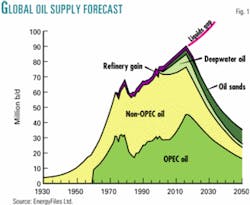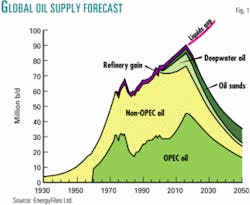Study: World oil forecast beset with reserves shortfalls
The world is facing a future of steep oil price increases that will occur sooner than many people now believe, concludes Canterbury, England-based energy analysts Douglas-Westwood Ltd. in the third edition (2004-50) of its World Oil Supply Report published Mar. 31.
Leading to that judgment are three fundamental findings study author Michael R. Smith of EnergyFiles Ltd. said were "strongly evident" from the study: increasing oil demand coupled with falling reserves and a decline in discovery rates.
Dwindling oil supply
The unprecedented rate of global oil reserves drawdown will be a major factor, Smith said. Although 99 countries have or can produce significant volumes of oil, 52, including the US, are already well past their peak (greater than 5 years), while another 16, including the UK, Norway, Australia, and China are at peak or will reach it soon, the analyst said.
The remainder will peak within the next 25 years, he added.
The report, Douglas-Westwood said, "further adds to the debate begun by [Royal Dutch/] Shell [Group]'s downgrading of oil reserves," which was followed by a number of other oil companies doing the same (OGJ, Apr. 5, 2004, p. 43).
"Perhaps all of Shell's 'lost' reserves may eventually be converted back to proven, but the problems of Shell and other oil companies do raise questions as to the present-day economic value of global reserves and the validity and soundness of processes to estimate them," Smith said.
"Cuts in oil companies' proven reserves may indicate new shortages in underreported volumes that were once used to counterbalance overreported volumes," Smith said.
Smith forecast a short period of oversupply by the former Soviet Union and from deep waters, but said that to offset declines elsewhere, large capital investments would be required within the Organization of Petroleum Exporting Countries after 2008 to rapidly increase production by at least 1-2 million b/d annually. "It is likely that by then the world will begin to see sustained growth in oil prices," he reported.
"OPEC cohesion continues, and it is assumed that Iraq will continue to be a member of OPEC and that its output ultimately will combine with theirs.
"Iraq is probably the most underexplored country in the world in relation to its productive potential. Once stability is achieved, a field development program must begin with very large infrastructure projects and huge investments, said Smith. "However, whether companies will be willing to take on the political and geological risk remains to be seen."
Iraq is likely to achieve 2.5-3 million b/d of oil production by the end of 2005, and maintain a level near this within OPEC for 3-4 years, before ramping up output, he said.
"Within 5 years the share of production that OPEC provides can increase once again without reducing the price."
Rising demand
However, "by 2008 all OPEC countries will need to begin to increase production as much as they can to meet even modest demand growth," the analyst said. As reserves dwindle, oil demand continues to soar.
Global oil demand in 2003, led by China, grew by 2.6% vs. 2002, the analyst said.
China's surge in oil-fired power generation capacity and a 75% jump in sales of passenger vehicles resulted in its 10% oil demand increase. Although unsustainable, China's demand growth is nonetheless expected to remain the highest in the world, Smith said.
"When you consider that the number of cars on British roads increased from around 2 million in 1950 to 25 million now, and revenue-passenger kilometers on the world's air transport has tripled from 1 trillion to 3 trillion since 1978, it stands to reason that economic growth in China will have a dramatic effect on automobile and airline oil usage," he said.
Declining discovery rates
Douglas-Westwood said that, in forecasting the likely future oil production profile of all existing and potential oil-producing countries, the study considered both known and 'yet-to-find' oil, condensate, and natural gas liquids resources onshore and offshore, in deep and shallow water, and the use of conventional and unconventional extraction methods.
The author drew from the EnergyFiles oil and gas supply information system to evaluate regional and global oil production limits and to define the year in which oil supplies would no longer be able to meet a given global demand.
Smith said the "glut" of oil that commentators predicted through 2003-04 failed to materialize. Projects have been delayed, and opportunities are receding for significantly increasing output outside of deep waters or OPEC countries. "Only Russia, Kazakhstan, and Azerbaijan can truly lay claim to significant conventional oil reserves, and projects here have been very slow to get off the ground," he said.
Although discoveries continued in deep and ultradeep Gulf of Mexico and Angola waters, no new oil provinces were identified last year. Deep waters currently are responsible for only 4% of production and are expected to reach only 10% of total capacity, the report indicated.
"The declining oil discovery rate is a signal that opportunities are limited and that production must decline in the future," Smith said. "The question is when?"
Smith said that, beyond 2020, the world's known and estimated yet-to-find reserves and resources could not support even the current level of production (see chart). And just a 1% growth in global economic activity would increase demand to the point that a production peak could occur as early as 2016. "Although the response will be complex, this will ultimately result in a sustained increase in oil prices."
Rapid action needed
In order to face a world with higher energy costs, consuming nations, users, suppliers, and service companies must take rapid action now, the author stressed. The first step is to understand the data and determine just where will be the sources of the world's oil over the next 20 years or so. The second step is to consider alternatives, many of which are expensive, environmentally questionable, and ineffective as oil substitutes because of transportation issues.
"All governments must review energy supply security now and develop policies and budgets consistent with impending shortfalls in oil supply in the coming years," urged Smith. "Japan and China are competing for Russian oil [while] a number of countries in Western Europe are already facing up to the prospect of energy supply shortfalls and [are] beginning major programs to encourage renewables.
However, Europe, Asia, and North America will need a lot more than renewable energy to overcome the long-term supply squeeze. Furthermore, alternative transport fuels such as hydrogen made from natural gas would probably require at least 15-20 years to bring on stream fully.
"Ultimately oil companies and countries alike must cope with declining production and locate and compete for new energy supplies by diversifying, increasing imports, or developing indigenous alternatives, Smith continued. "When and to what extent they can do this—and the degree to which the exporting countries can and will rapidly increase oil and gas production to meet new external demands—are fundamental to global economic health."

